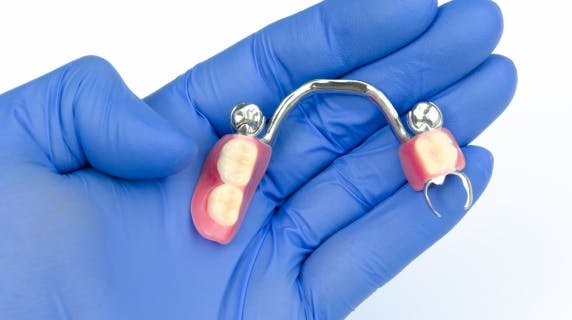Pros and Cons of Dental Implants
If you have teeth missing but dislike the idea of wearing false teeth, you might consider dental implants as another option.
Learn more about dental implants below – including what makes them different from partials, how they work, and the main pros and cons – to help you discuss implants with your dentist.
What Are Dental Implants?
Dental implants are a popular way to replace your missing teeth. An implant replaces a tooth by surgically inserting a fixture (similar to a screw) into the jaw bone, which eventually becomes bonded to the bone. Once the fixture is solidly in place, a false tooth, also known as a "crown" will be cemented onto it. A dental implant can be an effective option for filling out the gaps in your smile left by missing teeth – to help you eat, speak and smile with confidence.
How Are Dental Implants Fitted?
When fitting dental implants, your gums will be numbed with local anesthetic, so you shouldn’t feel any pain during surgery. Your dentist will make an incision in the gum and will then drill into the bone. The implant fixture will be inserted into this space in the bone, replacing the roots of your missing teeth.
After the implant has been inserted, it will need some time to heal. During this period (which can be several months in some cases), your bone grows around the implant to hold it firmly in place – this is called ”osseointegration.” If you need several implants, your dentist may give you temporary partials to wear after surgery while you heal, so that you don’t have to go without teeth.
Once your mouth has healed, your new artificial teeth can be fitted onto the titanium posts. If you’re getting just one implant, your dentist will customize a new tooth for you called a ‘crown’, designed to blend in with the rest of your teeth.
Keeping Dental Implants Clean
Just like your natural teeth, you should keep your implants clean with twice-daily brushing and flossing to avoid plaque and bacteria build up. You may need to see a dental hygienist on a more regular basis, but your dentist will advise you on this. Good oral hygiene and care will help your implants to last as long as possible.
Dentures vs. Implants – Pros and Cons
Pros of Implants
- Strong and stable: Implants are so stable because they are literally anchored in place, so you can have full confidence when you smile, eat and speak.
- They don’t affect speech: Because they’re screwed into the bone, dental implants don’t cover the palate – so, unlike some options, you won’t need to get used to speaking with them.
- Fixed or removable: You may have the option to have removable dentures placed onto your implants.
- Help preserve your facial structure: Did you know implants can actually encourage new bone growth? If you are missing multiple teeth, your body will sense this and begin to pull tissues from the mouth to use elsewhere. Because they are anchored in the jaw like normal teeth, having implants will help to preserve your jawbone, which can improve your facial structure.
Cons of Dental Implants
- Cost: Implants are often very expensive – averaging $4,800 for a single implant.
- Treatment time: Although some same-day implant services are available, these aren’t suitable for everyone. In most cases, it can take several months to complete the whole process, so it’s not usually a quick fix.
- Risk of implant failure: While most dental implants take with no issues, a small number (between 5% and 12%) of implants have been shown to fail due to complications.
- Risk of infection: Implants can cause a condition called peri-implantitis. This is a type of inflammation caused by an infection in the bone and is a recognized complication in roughly 5-8% of cases.
- Risk of nerve damage: Though rare, denture implants can lead to nerve damage in some cases, which may cause numbness or tingling in the area around the implant.





